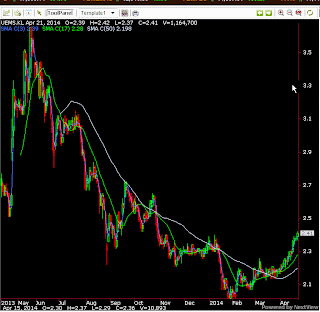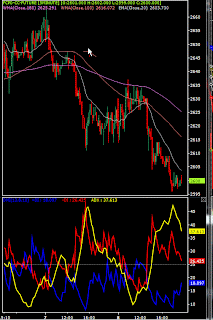FKLI Futures Trading - Bursamalaysia
This will chronicle trading in the FKLI & FCPO futures. If you don't like what you see/read in this blog, just surf away. These opinions are our personal opinions and just a record of our thoughts..."In evolution, it’s not the biggest, the fiercest nor the smartest that survive, it’s the one that changes the fastest.” I.e. the key word is to adapt the trading style to the markets, until it stops working
Wednesday, April 30, 2014
Tuesday, April 29, 2014
Labels: music
Labels: music
Monday, April 28, 2014
Labels: music
Sunday, April 27, 2014
Saturday, April 26, 2014
Labels: music
Friday, April 25, 2014
Not a surprise
In the history of markets, this type of high blyer, supposedly star, big volume traders blowing up happens on a frequent basis.
(Chapter I) … “Another lesson I learned early is that there is nothing new in Wall Street. There can’t be because speculation is as old as the hills. Whatever happens in the stock market to-day has happened before and will happen again. I’ve never forgotten that.”
Thursday, April 24, 2014
Wednesday, April 23, 2014
Chapter V) … "The customers, who were all eager to be shoved and forced into doing things so as to lay the blame for failure on others..."
In a wonderfully entertaining narrative about a battle-hardened and wealthy old speculator named Mr. Partridge, Jesse Livermore exposes one of the most dangerous character flaws a speculator can have, a lack of absolute personal accountability and responsibility. Unless a speculator takes full personal responsibility for all of the trades that he chooses to make, win, lose, or draw, he will never achieve great success.
Just as today, the majority of speculators back in Mr. Livermore's time wanted to congenitally blame others for their own trades that turned sour. Rather than accepting the full weight of their own decisions, they desperately wanted their brokers or advisors to push them into trades so these speculators could avoid accepting the responsibility themselves for failed trades. Elsewhere Livermore talks about speculators perpetually blaming external manipulation for their own bad bets, another way of refusing to accept full responsibility for the fruits of their own actions.
Just like a child who never learns to be responsible, a speculator who cannot fully accept any possible outcome on any trade that he freely chose to make is doomed to immature mediocrity. If you or I use our own God-given brains and decide to execute on a particular trade, we cannot blame anyone else but ourselves if the trade doesn't work out. It doesn't matter where the information came from that led to the trade, it is ultimately the responsibility of the individual speculator who decided to execute on this information regardless of the outcome.
So before you freely choose to launch a trade, while you are gathering information and running reconnaissance, realize that you most hold yourself absolutely accountable for your own decision. If you win, great, congratulations and many kudos on another successful trade! If you lose however, the loss is your fault alone and your responsibility alone since you freely chose to make the trade.
Every speculator must always be ready to win or lose on each and every trade, and to fully accept responsibility for their own decisions always. Losses are simply part of this grand game and just have to be accepted, since no one but God can see the future before it happens. When you freely choose to pull the trigger on your own trade, the outcome is always 100% your own responsibility and no one else's. If you cannot accept this truth, then you shouldn't be speculating.
(Chapter V) … "I think it was a long step forward in my trading education when I realized at last that when old Mr. Partridge kept on telling the other customers, "Well, you know this is a bull market!" he really meant to tell them that the big money was not in the individual fluctuations but in the main movements – that is, not in reading the tape but in sizing up the entire market and its trend."
In all of "Reminiscences" this crucial idea that the Really Big Money is always earned by prudently riding the large trends over time and not in day trading every minute fluctuation is one of the central themes of the book. Livermore hammers this again and again, attacking it from countless angles and spicing up all of his amazing lessons with his own enthralling personal experiences.
This old and successful speculator that Livermore mentions, Mr. Partridge, would always politely tell the younger speculators who asked him trading questions that it was a bull market. The young speculators were always eager to trade, but Partridge was old and battle-scarred enough to know that no mere mortal could even hope to catch every individual fluctuation so the wisest strategy was just to ride the major trends. His simple reply, which would annoy the youngsters since they couldn't yet perceive the deep wisdom in it, was to subtly advise them to just ride the primary trend and not worry about rapid-fire trading.
If a particular market happens to be in a primary bull trend, then just be long and don't worry about trying to interpret and trade upon the essentially random day-to-day market noise. If a particular market is in a primary bear trend, then either sit out in cash or stay short and wait for the trend to fully mature and run its course. Don't try to frantically outguess the primary trend everyday, just accept it and trade with it and you will win in the end.
And this leads into what is perhaps the most famous quotation out of the entire book, Jesse Livermore's legendary "be right and sit tight" wisdom! While a long quotation, I just have to offer this entire paragraph in its original shining unedited brilliance…
Day trading, foolhardy
There is nothing 'new' in Wall St...
(Chapter I) … "Another lesson I learned early is that there is nothing new in Wall Street. There can't be because speculation is as old as the hills. Whatever happens in the stock market to-day has happened before and will happen again. I've never forgotten that."
Oh, what a priceless opening lesson! It reminds me of ancient Israeli King Solomon's unequaled wisdom stating that "there is no new thing under the sun." In the last few years literally trillions of dollars have vaporized, shattering countless families' precious hopes and dreams, because investors foolishly believed the silly new-era hype surrounding the doomed NASDAQ tech-stock bubble.
Booms, bubbles, bursts, and busts have been around for centuries and will continue into the future. Every major stock-market bubble is heralded as a "New Era" at the time before it bursts. Everything investors and speculators are witnessing in today's markets has come to pass before. Even though technology relentlessly marches forward, there is one ultimate driving force behind the endless financial-market machinations that never changes.
This force is the human heart. Every speculator is both blessed and burdened with one. As long as humans trade, the titanic warring emotions of greed and fear will lead to endless waves of overvalued then undervalued markets, booms then busts, rallies then downlegs. A greedy or fearful trader today behaves no differently than a greedy or fearful trader 100 years ago or 100 years from now in the future. There is nothing new in Wall Street.
How to make money as a trader?
Tuesday, April 22, 2014
Monday, April 21, 2014
Friday, April 18, 2014
Thursday, April 17, 2014
Wednesday, April 16, 2014
Labels: music
Tuesday, April 15, 2014
Monday, April 14, 2014
More from Adam Hamilton on the Wisdom of Jesse Livermore
(Chapter V) … “The customers, who were all eager to be shoved and forced into doing things so as to lay the blame for failure on others...”
In a wonderfully entertaining narrative about a battle-hardened and wealthy old speculator named Mr. Partridge, Jesse Livermore exposes one of the most dangerous character flaws a speculator can have, a lack of absolute personal accountability and responsibility. Unless a speculator takes full personal responsibility for all of the trades that he chooses to make, win, lose, or draw, he will never achieve great success.
Just as today, the majority of speculators back in Mr. Livermore’s time wanted to congenitally blame others for their own trades that turned sour. Rather than accepting the full weight of their own decisions, they desperately wanted their brokers or advisors to push them into trades so these speculators could avoid accepting the responsibility themselves for failed trades. Elsewhere Livermore talks about speculators perpetually blaming external manipulation for their own bad bets, another way of refusing to accept full responsibility for the fruits of their own actions.
Just like a child who never learns to be responsible, a speculator who cannot fully accept any possible outcome on any trade that he freely chose to make is doomed to immature mediocrity. If you or I use our own God-given brains and decide to execute on a particular trade, we cannot blame anyone else but ourselves if the trade doesn’t work out. It doesn’t matter where the information came from that led to the trade, it is ultimately the responsibility of the individual speculator who decided to execute on this information regardless of the outcome.
So before you freely choose to launch a trade, while you are gathering information and running reconnaissance, realize that you most hold yourself absolutely accountable for your own decision. If you win, great, congratulations and many kudos on another successful trade! If you lose however, the loss is your fault alone and your responsibility alone since you freely chose to make the trade.
Every speculator must always be ready to win or lose on each and every trade, and to fully accept responsibility for their own decisions always. Losses are simply part of this grand game and just have to be accepted, since no one but God can see the future before it happens. When you freely choose to pull the trigger on your own trade, the outcome is always 100% your own responsibility and no one else’s. If you cannot accept this truth, then you shouldn’t be speculating.
Sunday, April 13, 2014
Labels: music
Labels: music
Friday, April 11, 2014
Wisdom of Jesse Livermore
(Chapter II) … “The desire for constant action irrespective of underlying conditions is responsible for many losses in Wall Street even among the professionals, who feel that they must take home some money every day, as though they were working for regular wages.”
This classic Jesse Livermore quote picks up just where we left off in the first essay, on the perpetually popular game of day trading. Livermore was not fond of day trading and he touches on the great dangers of it many times in his discourses. He advocated a much more patient strategic speculation approach. This broader perspective and slower pace of trading helped him to ultimately harvest far higher profits and avoid the immense stress and pitfalls of ultra-short-term speculation.
Livermore believed that a speculator should diligently study the markets and then patiently stalk any potential trades. He felt that speculators had a much greater probability of succeeding if they intelligently defined a potential entry point in advance through careful research and then patiently waited for it to actually come to pass in the real-world markets. This led to staking intelligent positions and eliminated the possibility of the dangerous unthinking “impulse trading” so common in day trading.
Once his carefully-planned positions were deployed, Livermore advocated the strategic side of short-term speculation, holding carefully targeted positions through an entire bullish or bearish swing of the markets. Sometimes these swings lasted weeks, usually they lasted months, and occasionally they lasted more than a year. Over and over Jesse Livermore emphasizes that these strategic-oriented position trades had both the highest probability of success and the highest potential profits as rewards for being right.
Today’s speculators can learn a great lesson from the Livermore quote above. The really big wins in trading don’t come out of daily scalping, but out of diligently riding entire major bullish and bearish market swings. Jesse Livermore wisely points out that those who “desire for constant action” and trade regardless of underlying big-swing market conditions face “many losses”.
Speculation is like a grand real-world game of chess, a thinking-man’s strategy game sprawling out into the unknown future across weeks and months. If you want to have a shot at growing into an elite speculator, you are best off ignoring the small gains and losses of day trading and holding out for the really big wins possible by riding entire bull or bear swings. Speculators are not “working for regular wages” and don’t need small daily wins, all we really need are the enormous Big Trade wins that usually appear several times a year or so.
Thursday, April 10, 2014
Labels: music
Labels: music
Wednesday, April 09, 2014
Labels: music
Tuesday, April 08, 2014
Monday, April 07, 2014
Saturday, April 05, 2014
CFTC Commitments of Traders - week ending April 1 By Investing.com
http://www.investing.com/news/forex-news/cftc-commitments-of-traders---week-ending-april-1-275939
On the Comex division of the New York Mercantile Exchange, gGoldfor June delivery was up 1.42% at $1,302.90, off a session high of $1,307.00 and up from a low of $1,284.50The June contract settled down 0.48% at $1,284.60
Friday, April 04, 2014
Thursday, April 03, 2014
"There is the plain fool who does the wrong thing at all times anywhere, but there is the Wall Street fool who thinks he must trade all the time."J Livermore


From Dragons and Bulls by Stanley Kroll
Introduction and Foreword
The Importance of an Investment Strategy
5 The Art of War, by Sun Tau (circa 506 BC) and The Art of Trading Success (circa AD 1994)
That's the way you want to bet
Long-term v Short term trading
Technicals v Fundamentals
Perception v Reality
Part 1: Winners and Losers
Part 2: Winners and Losers
Sun Tzu: The Art of War
Those who tell don't know, those who know don't tell
Why there is no such thing as a "bad market"
The Secret to Trading Success
The Experts, do they know better?
Risk control and money management
Larry Hite: The Billion Dollar fund Manager
Systems Trading:Kroll's Suggested Method
Buy the Strength Sell the Weakness
Good advice
The 'good bets' business by Larry Hite
Don't lose your shirt
Ed Sykota's secret trend trading system





















































